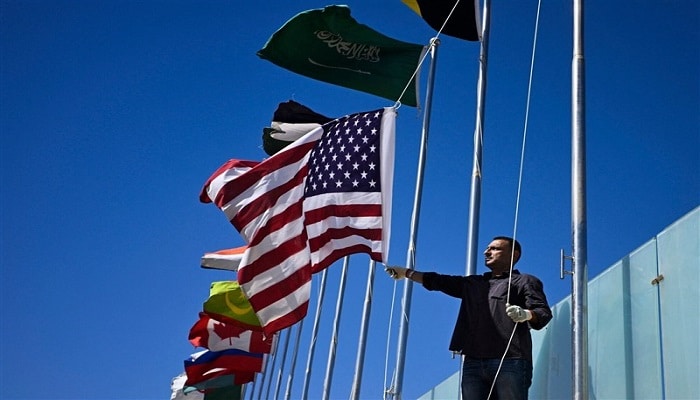PNN – The Gaza peace conference in Sharm el-Sheikh, Egypt, focused on goals designed to help the United States and the Zionist regime, and could not advance the interests of Iran or the Palestinians.
According to the report of Pakistan News Network, Egypt will host an international summit in Sharm el-Sheikh on Monday, October 13, 2025, attended by leaders and officials from more than twenty countries, claiming to finalize an agreement to end the war in the Gaza Strip. Despite an invitation from the Islamic Republic of Iran, Tehran has decided not to attend the summit.
Was the Sharm el-Sheikh meeting an opportunity to lift sanctions?
This decision to reject Egypt’s invitation to participate in the summit may seem surprising at first glance, but an examination of the summit’s stated goals and structure shows that positive expectations, such as progress in lifting sanctions on Iran or advancing its national interests, were not met from the event, making Tehran’s decision not to participate seem logical.
One of the main reasons why this meeting could not have produced tangible achievements for Iran is the complete separation of Iran’s nuclear issues from regional crises such as the Palestinian conflict.
The agenda of this summit so far has mentioned issues such as a ceasefire, the reconstruction of Gaza, and the political management of the region, which have no direct connection to the differences with Iran over its nuclear program and sanctions, which are supposed to be the sole focus of the talks with the United States.
Read more:
Iran’s considerations in preserving national dignity
Tehran sees this meeting as under the influence of the United States and Israel and believes that Iran’s participation in this meeting, given that its nuclear facilities were targeted by the United States and the Zionist regime a few months ago, could be interpreted as a sign of softness. Such a partnership could also allow Donald Trump to claim that he forced Iran into “unconditional surrender” without making concessions and using only force and pressure.
Such an outcome would not only not have a positive outcome for Iran, but could also weaken its national dignity and diplomatic standing in the face of foreign pressure.
The subject of the resistance front
Furthermore, the summit could not have provided a platform for strengthening the position of Palestinian resistance groups, such as Hamas, which Iran supports. Hamas, as an independent force, is capable of representing its interests in the negotiations and did not need Iran’s presence as a mediator at the summit.
Therefore, Iran’s participation in the summit was not expected to strengthen the resistance position or advance Palestinian rights. On the contrary, Iran’s presence could be misinterpreted as an attempt to influence the decision-making of Palestinian groups, which contradicts Iran’s long-standing policy of supporting the autonomy of these groups.
America’s hidden goals at the Sharm el-Sheikh summit
From the perspective of the hidden goals of this summit, it seems that the event is more focused on reducing military and political pressure on Israel than on resolving the Gaza crisis. Israel’s military operation, despite widespread support from the United States, has failed to contain the Palestinian resistance.
This failure has led Washington and Tel Aviv towards diplomatic solutions that are ostensibly peaceful but in practice seek to embolden Israel after isolating the regime in international forums. Therefore, participation in this meeting was not expected to advance the interests of regional countries, including Iran.
Ultimately, the summit did nothing to ease economic pressure or strengthen Iran’s regional position, while serving the political goals of Donald Trump, who is seeking to gain publicity for his domestic campaign by emphasizing “an end to the Gaza war.”
Strengthening the reconciliation process
In his speeches over the past few days, Trump has repeatedly emphasized that everyone, even Iran, supports his plan for Gaza. Therefore, Iran’s presence in Sharm el-Sheikh would effectively make Iran fall into the trap of Trump’s showy policies.
On the other hand, it seems that Trump sees this meeting as a basis for expanding the compromise plan with the Zionist regime, known as the “Abraham Peace”, and will somehow consider the countries participating in them to be aligned with this plan.
Tehran sees the meeting as under the influence of the United States and Israel and believes it could not help advance its national interests, such as reducing economic pressures or strengthening its regional position.
Strengthening the discourse of resistance and negating hegemony
Another issue is that Iran’s regional influence is largely due to its soft power and anti-colonial discourse, rather than its presence at summits like Sharm el-Sheikh. This discourse, which emphasizes political independence and resistance to Western hegemony, has gained widespread acceptance among resistance groups and public opinion in the region, especially in Palestine, Lebanon, Iraq, and Yemen.
By providing moral support to groups like Hamas and Hezbollah, which have positioned themselves against foreign occupation and intervention, Iran has been able to emerge as an independent regional leader to stand up to the masters of money and force.
In addition, Iran has positive and constructive interactions with all countries in the region, including countries such as Iraq, Syria, Qatar, and Oman, which have been strengthened through bilateral diplomacy and economic and political cooperation. These interactions, which include trade agreements, security cooperation, and mediation in regional disputes, have allowed Iran to maintain its influence without being dependent on international forums.
Over the past two years, the Islamic Republic of Iran has used this influence to pressure the Zionist regime to stop the genocide in Gaza and has consulted with many countries in the region in this regard.

